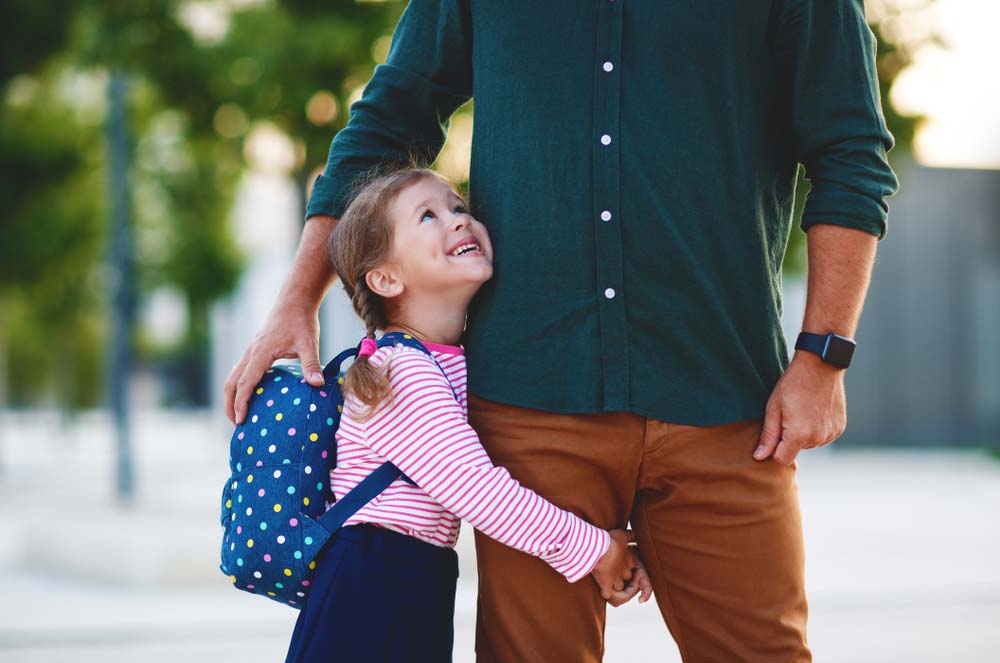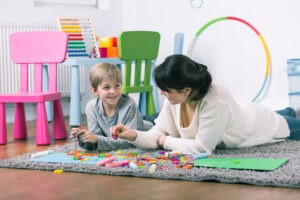Each Fall, the first day of school is set with scenes of smiling little faces, kids dressed in their favorite outfits, toting backpacks stocked with new school supplies. Sure, some students feel nervous and a few tears may be shed here and there. That’s usually just chalked up to simple first day jitters.
This fall, most schools are fully reopening to in-person instruction. Many parents are preparing to send their children back into the classroom. But arming their kids with masks and hand sanitizer isn’t the only thing that might be different about the morning of the first day of school. Leaving home, separating from their family, and fears surrounding Covid-19 may cause increased levels of anxiety for both new and returning students.
How can parents keep calm and respond to this? By being prepared with some simple strategies for a successful return to school!
#1: Routine, routine, routine.
Maybe your child is starting school for the first time. Or, he or she could be returning after completing virtual school at home due to the pandemic. Either way, establishing a routine is a key for a successful transition. Going to school in 2021 can include wearing masks, temperature checks, and social distancing among students. With all of these changes (not to mention leaving the comfort of life at home, which may have a less structured schedule), routines provide your child with consistency and a feeling of safety.
Use visual supports such as a calendar to mark the first day of school, or what days your child will go to school. Ease your child into their upcoming school routine by gradually adjusting bedtimes and morning wake up times to become closer to their new schedule.
#2: Model Strength and Positivity
Studies show that a parent’s attitude and behavior strongly correlates with that of their child during separations like morning drop off on the first day of school. Meaning, when parents maintain and exude a positive attitude about their child’s return to school, their children are likely to do the same. Providing positive, specific praise to your child can reinforce their behaviors. Try making statements such as, “You are being so brave by starting school next month. I’m proud of you!”
Another tip backed by research? As tough as it can be, if your child does show signs of difficulty transitioning during drop-off, try not to linger in the classroom too long. This can interfere with the classroom structure and encourage your child’s distressing behaviors. Stay strong and chances are, your child will too!
#3: Rehearse
According to experts, practicing the morning drop off and having your child spend some time in the classroom or the school playground can help increase their comfort level there. Pandemic precautions have resulted in many parents and children spending an increased amount of time together. While that family bonding time has been appreciated by many, it can also make it harder for children to separate from the parents. Rehearse this as well, by separating from your child to cook a meal in the kitchen, run an errand, or go to a yoga class a few times a week. Leave for slightly longer each time. This will help your child become familiar with the routine of saying goodbye to you and with staying with another caregiver.
#4: Validate Feelings
#5: Seek Help as Needed
While talking with your child and preparing for their return to school transition, if you notice any concerns with their communication or coping skills it may be best to seek help. TherapyWorks offers pediatric speech, occupational, and physical therapy services. Following researched-backed techniques can help you put a plan in place for easing your child’s worries. But if having a language or learning disorder is causing your child anxiety about keeping up academically, or if you have concerns with their social skills as they return to daily interactions with peers, consider consulting a professional.








